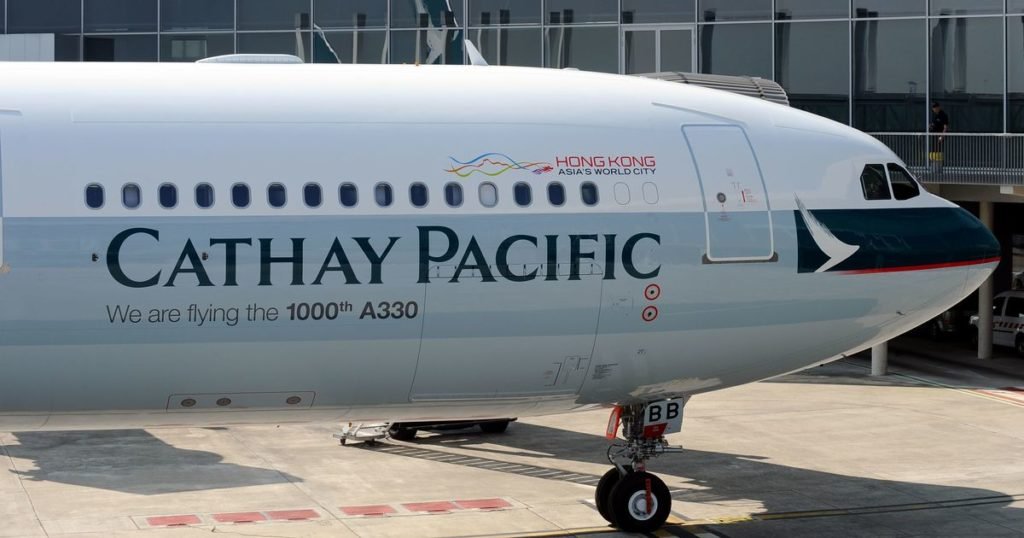Hong Kong’s most popular airlines have published the most devastating results due to a sharp downturn in travel during the global pandemic along with major restructuring costs. The company had predicted earlier last year that it expected its second-half losses to be worse than the record first-half loss of $1.3bn. Also, last year’s loss compared with a profit of $220m in 2019, when profits were hit by political turmoil in Hong Kong.
Hong Kong’s Cathay Pacific Marks A Huge Loss Of $2.8bn For 2020
It was the end of last year when Cathay Pacific has announced it is closing its subsidiary Cathay Dragon and cutting 8,500 jobs. Cathay Dragon was a full-service regional carrier flying mainly to mainland China and other Asian destinations. Cathay Pacific says it hopes to retain most of Cathay Dragon’s routes. Many other airlines are on the brink of survival as the Covid-19 pandemic batters travel and tourism. The cutbacks at Cathay Pacific are part of the airline group’s attempt to reduce costs during travel restrictions that governments have imposed to limit the pandemic. Cathay says it has already tried to cut costs by deferring aircraft deliveries, implementing special leave schemes, and cutting executive pay. It also received a $5bn bailout from the Hong Kong government in June. But the airline group is still losing as much as $260m a month. Cathay Pacific and its budget carrier Hong Kong Express will take over Cathay Dragon’s routes.

Cathay Pacific Chairman Patrick Healy said that “What we need to do is focus our efforts on a single premium full-service carrier brand, which will be Cathay Pacific, complemented by a single low-cost leisure brand in Hong Kong express. “Although the restructure will itself cost $284m, the airline said it will reduce costs by $64m a month in 2021. Of the 8,500 positions that will be eliminated, 5,300 jobs will be from Hong Kong and a further 600 from overseas. A total of 2,400 positions are currently unfilled because of a hiring freeze and the closure of some overseas operations. The job losses account for around 24% of Cathay Pacific’s total staff. The airline will also ask Hong Kong-based cabin and cockpit crew to agree to changes in their employment conditions “to match remuneration more closely to productivity”. Cathay said this week that it expects to run at half capacity through next year. Mr. Healy added that “This crisis is deeper, and the road to recovery slower and patchier than anyone thought possible just a few months ago.”
Also, the report came in the last June that Under the deal the Hong Kong government could take a 6% stake in Cathay and can have two observers on its board. As part of the restructuring plan the company said it would implement another round of executive pay cut. It comes as airlines around the world are struggling to survive due to global travel restrictions.
The airline’s chairman also said that Cargo was the best performer for the airline, though it too saw a downturn, because the reduction in passenger flights, which also carry cargo, caused a reduction in capacity. “Our short-term outlook continues to be challenging. However, we remain confident in the long-term future and competitive position of our airlines,” he said. He also opinioned that 2020 was a bruising year for Hong Kong’s flag carrier, which unlike some other airlines, does not have a domestic travel market to fall back on.
Cathay Pacific had previously forecast that it expected to offer less than half of its usual capacity in 2021, calling the forecast “the most optimistic that we can responsibly adopt”. Statistics states that in January, the airline carried a total of 30,410 passengers, a decrease of 99% compared to January last year. The airline said new, stricter quarantine measures in Hong Kong could further increase the airline’s cash burn by up to $52m per month, on top of its current costs of up to $190m. The entire industry has suffered during the pandemic.
On the other side, the IATA has forecast that air travel will not return to pre-pandemic levels until 2024. The International Air Transport Association (IATA) says it expects its digital Covid Travel Pass will be ready “within weeks”. The pass is an app that verifies a passenger has had the Covid-19 tests or vaccines required to enter a country.
It also verifies they were administered by an approved authority. The industry body sees the pass as essential for reopening air travel, as many countries still have strict restrictions or quarantines in place. Vinoop Goel, IATA’s regional director of airports and external relations. Said that “The key issue is one of confidence. Passengers need to be confident that the testing they’ve taken is accurate and will allow them to enter the country.” And then governments need to have the confidence that the tests that the passengers claim to have been one which is accurate and meets their conditions.” He added.
However, the International Air Transport Association (IATA) predicted in January that the world’s airlines need another $70bn-$80bn of government support to get through the pandemic.

